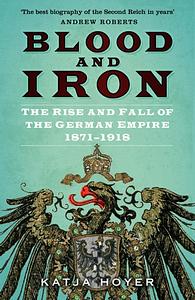Take a photo of a barcode or cover
A whistle-stop tour of the German Empire from its foundation in 1871 to its collapse in the aftermath of the First World War. I was hoping for a deeper dive on the topic than I got from Leaving Cert History back in the day, but with the exception of a couple of quirky anecdotes (did you know that Wilhelm II spent his post-war exile obsessively cutting down trees?) didn't get it. This brief synthesis of the period is adequate, but tries to subtly normalise Bismarck and Wilhelm II—make them just Some Guys responding to Ineffable Historical Forces—in ways I found a bit hinky.
Slightly clunky translation from the original German. The audiobook narrator made a number of pronunciation errors—oddly enough, mostly of English words rather than of German ones, although there was the weird, repeated tic of pronouncing "Somme" as if it were the German die Summe rather than the French river/battle.
Slightly clunky translation from the original German. The audiobook narrator made a number of pronunciation errors—oddly enough, mostly of English words rather than of German ones, although there was the weird, repeated tic of pronouncing "Somme" as if it were the German die Summe rather than the French river/battle.
In Blood and Iron: The Rise and Fall of the German Empire 1871–1918, Katja Hoyer provides a rich exploration of the German Empire from its formation to its collapse. She skillfully examines how Otto von Bismarck's strategy of unification through "blood and iron" set the stage for the Empire's rapid rise and eventual downfall. Her deep dives into the characters of Bismarck and Kaiser Wilhelm II are particularly enlightening, revealing their roles in shaping and destabilising the nation and shaping a distinct path for the nation that almost seems unavoidable in hindsight.
Hoyer's narrative captures the complex interplay of militarism, nationalism, and industrialisation, showing how these forces contributed to both the Empire's successes and its implosion. By analysing the balance between tradition and progress, she illuminates the internal discord that ultimately led to Germany's collapse.
Overall, Blood and Iron is a concise and insightful examination of a transformative era, making it a valuable read for anyone interested in the intricate dynamics of power and ambition in European history.
⭐ ⭐ ⭐ ⭐ 1/2
Hoyer's narrative captures the complex interplay of militarism, nationalism, and industrialisation, showing how these forces contributed to both the Empire's successes and its implosion. By analysing the balance between tradition and progress, she illuminates the internal discord that ultimately led to Germany's collapse.
Overall, Blood and Iron is a concise and insightful examination of a transformative era, making it a valuable read for anyone interested in the intricate dynamics of power and ambition in European history.
⭐ ⭐ ⭐ ⭐ 1/2
informative
medium-paced
medium-paced
adventurous
informative
reflective
medium-paced
challenging
dark
hopeful
informative
reflective
relaxing
sad
tense
medium-paced
A good lay-history of the German Empire up to and during WWI. It's not a textbook but I found it still giving intimate details about its subject. It is slow to start but I really believe it's worth the read and very enjoyable. 4 stars.
This niche period of interests me, but I was expecting quite a difficult read. However, it’s excellently written and engaging.
An excellent introduction to the German Empire. Hoyer balances the content of her book exceptionally well: politics, foreign policy, economics, culture, science, military matters; it's all there. The only reason I gave this book 4 stars instead of 5 was various textual errors: poor capitalization (e.g. "Huns" was not capitalized), a few repetitive sentence structures, and other such typographical issues that should have been caught by the publisher. Hoyer wrote an exceptional book; the manuscript could use a little more editing though.
informative
slow-paced
informative
fast-paced



